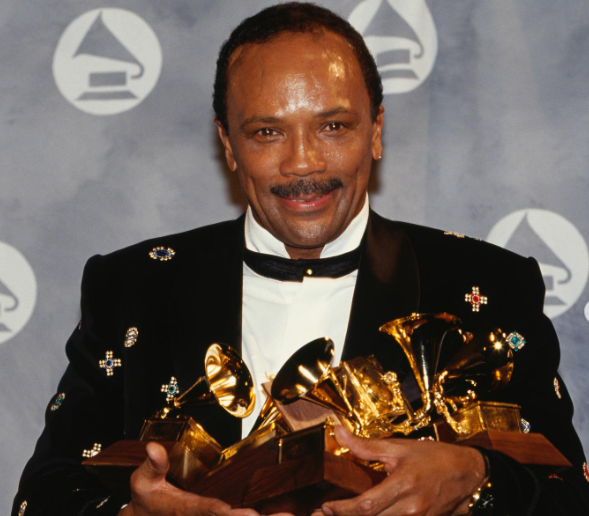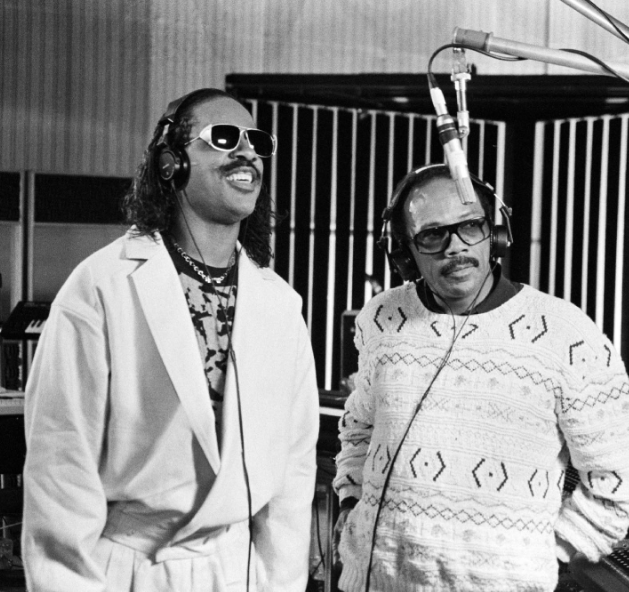
Grammy-winning producer Quincy Jones has passed away at the age of 91. His publicist, Arnold Robinson, shared with TMZ that Jones died peacefully on Sunday night at his Bel-Air home, surrounded by family.
In a statement, the family expressed, “Tonight, with full but broken hearts, we share the news of our father and brother Quincy Jones’ passing. While this is an immense loss for our family, we celebrate the remarkable life he led and know there will never be another like him.
Jones leaves an indelible legacy that shaped music, film, and culture. His contributions to art and his compassion for others will be celebrated for generations.

Here’s a list of some of Jones’ career-defining accomplishments:
- Early Beginnings: Born on March 14, 1933, in Chicago, Quincy Delight Jones Jr. grew up during the Great Depression.
- Chicago Roots: Jones spent his early years in Chicago, which influenced his love for jazz and blues.
- Seattle Move: His family relocated to Seattle when he was 10, where his music journey took root.
- Early Talent: By age 12, he was already learning to play the trumpet.
- High School Band: Jones played in Garfield High School’s band, where his talents quickly stood out.
- Teen Mentor: He was mentored by Ray Charles, who taught him about music arrangement.
- First Arrangements: Jones began arranging music at 15, working with local bands.
- Young Musician: He received a scholarship to Berklee College of Music in Boston but left early for performance opportunities.
- Lionel Hampton: He joined Hampton’s band in the early 1950s, solidifying his career path.
- European Tour: Touring Europe with Hampton introduced him to new musical influences.
- First Recording: Jones’ first recorded arrangements were with Lionel Hampton’s band.
- Paris Move: He moved to Paris in the 1950s to study composition with Nadia Boulanger and Olivier Messiaen.
- Mercury Records: Quincy became the first Black vice president of Mercury Records in 1964.
- Jazz Giant: In the ‘50s and ‘60s, Jones became a major figure in jazz.
- Composing for Films: He scored his first film, The Pawnbroker, in 1964.
- James Bond: He scored The Italian Job and was approached to score Live and Let Die but declined.
- TV Themes: Composed themes for TV shows like Sanford and Son.
- Iconic Collaborations: Worked with legendary artists like Frank Sinatra, Aretha Franklin, and Michael Jackson.
- Count Basie: Quincy collaborated with Count Basie, arranging the album Basie & Beyond.
- Grammy Winner: He won his first Grammy in 1963 for I Can’t Stop Loving You with Count Basie.
- Frank Sinatra: Jones arranged for Sinatra’s It Might as Well Be Swing.
- Sinatra’s “The Best Is Yet to Come”: One of their memorable collaborations.
- Michael Jackson: Produced Jackson’s albums Off the Wall, Thriller, and Bad.
- “Thriller” Success: Thriller became the best-selling album of all time under his production.
- Historic Grammy Count: He has won 28 Grammys, making him one of the most awarded artists.
- Ella Fitzgerald: Worked on Fitzgerald’s album Ella in London.
- Film Scoring Pioneer: One of the first Black composers to break into Hollywood.
- Ironside Theme: Composed the theme for the TV show Ironside.
- Dizzy Gillespie: Collaborated with Gillespie, one of his jazz inspirations.
- Big Band Sound: Formed The Quincy Jones Big Band in 1959.
- Love of Jazz: Jazz remained a central part of his identity throughout his life.
- The Color Purple: Co-produced the soundtrack for the 1985 film.
- Back on the Block: His 1989 album won Album of the Year at the Grammys.
- Influence in Hip-Hop: Inspired artists like Tupac and Dr. Dre.
- Academy Awards: Received seven Oscar nominations, though he never won.
- Soul Bossa Nova: The song became a classic and was used in Austin Powers.
- Jazz Foundation: Supported young jazz musicians through the Jones Foundation.
- Producing Standards: Set high standards for quality in music production.
- Quincy Jones Productions: Founded his own production company in 1975.
- Broadway: Co-produced the Broadway musical The Color Purple.
- Sidney Lumet: Collaborated on The Pawnbroker with Lumet.
- Quincy Jones’ Jook Joint: His tribute album featured many of his collaborations.
- TV Production: Produced shows like The Fresh Prince of Bel-Air.
- Michael Jackson’s Bad: One of the most iconic collaborations in pop history.
- Founder of VIBE: Created the urban culture magazine VIBE in 1993.
- We Are the World: Produced the charity single for African famine relief.
- Philharmonic: Had the Quincy Jones Philharmonic orchestra.
- Newport Jazz Festival: Quincy was a notable presence.
- Walt Disney: Worked with Disney on The Hunchback of Notre Dame music.
- Humanitarian Work: Advocated for African American artists and civil rights.
- Kennedy Center Honor: Received the award in 2001.
- Hollywood Walk of Fame: His star on Hollywood Boulevard marks his contributions.
- Opera Influence: Infused orchestral elements into jazz and pop.
- Young Talent Advocate: Mentored countless artists and producers.
- Grammy Legend: Honored with the Grammy Legend Award in 1991.
- Bebop Influence: Early career heavily influenced by bebop jazz.
- Global Collaborations: Worked with musicians worldwide.
- Tony Bennett: Quincy worked with Bennett on multiple projects.
- Master of Jazz Arrangements: Known for intricate and rich jazz arrangements.
- Black Filmmakers: Supported Black filmmakers in Hollywood.
- Def Jam: Collaborated with Russell Simmons in the early days of Def Jam.
- A&M Records: Partnered with Herb Alpert in his early career.
- Jones Hall of Fame: Inducted into the Rock and Roll Hall of Fame.
- “Ai No Corrida”: Produced the hit single, later popularized by Chaz Jankel.
- Composer for Classics: Contributed to soundtracks of classic films.
- Orchestral Influence: Introduced classical elements into pop.
- Pioneer in Diversity: Broke racial barriers in the music industry.
- Music Philanthropy: Supported arts programs globally.
- Jones’ Quintet: Formed a renowned jazz quintet in the 1960s.
- Modern Pop Influence: His work continues to inspire modern pop.
- Duke Ellington Influence: Quincy considered Ellington a mentor.
- Grammy Trustee Award: Honored by the Grammy Foundation.
- HBO’s Listen Up: A biographical documentary about his life.
- Music Therapy: Promoted music’s therapeutic effects.
- Jazz at Lincoln Center: Supported jazz education initiatives.
- Producer of Legends: Worked with Stevie Wonder, Diana Ross, and more.
- Influence on Fusion: Combined genres, inspiring fusion artists.
- Visionary Mentor: Known for nurturing new talent.
- Cultural Icon: Acknowledged worldwide as a cultural leader.
- Bossa Nova Fusion: Fused bossa nova and jazz elements.
- Michael Jackson’s Off the Wall: Redefined pop music in the 1970s.
- Influential Arranger: Respected as a top arranger in music history.
- Harvard Recognition: Honored for his cultural contributions.
- Film Producer: Produced films including The Color Purple.
- Emmy Winner: Won an Emmy for Roots.
- Documentary Subject: The 2018 documentary Quincy highlighted his legacy.
- French Legion of Honor: Honored by France for his contributions to culture.
- Great American Songbook: Quincy was a living embodiment of it.
- Hubbard Hall Influence: Frequent performer at Hubbard Hall.
- U.N. Ambassador: Named Ambassador for the United Nations in 1998.
- Enduring Legacy: His influence continues to shape music and culture.



